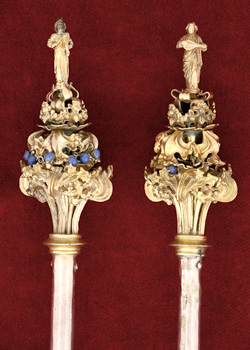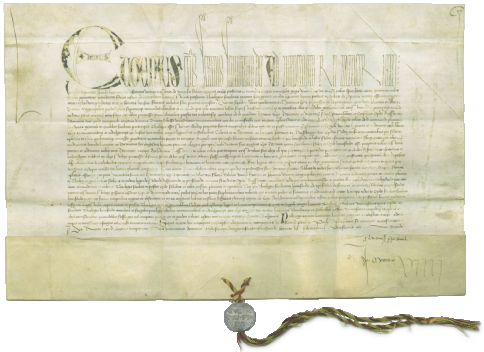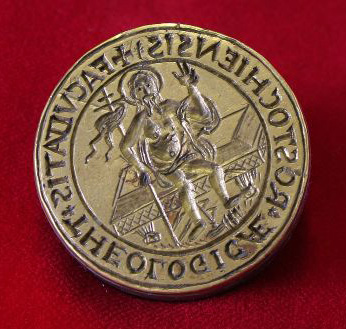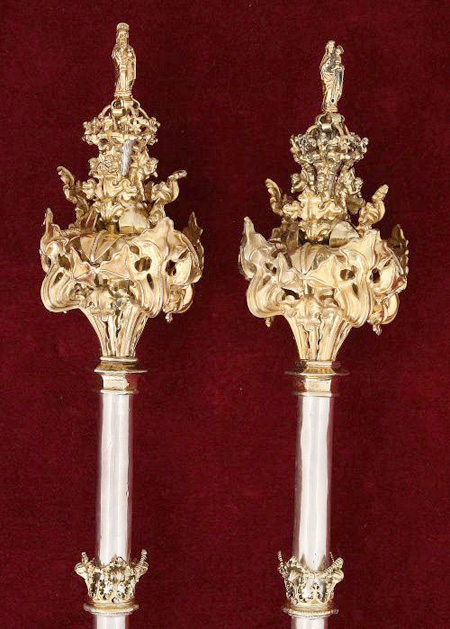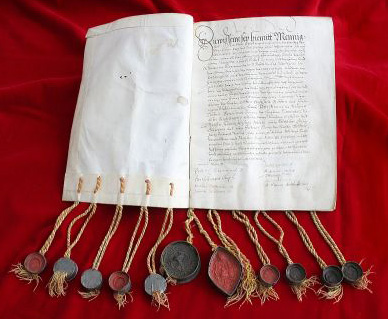08.09.1418
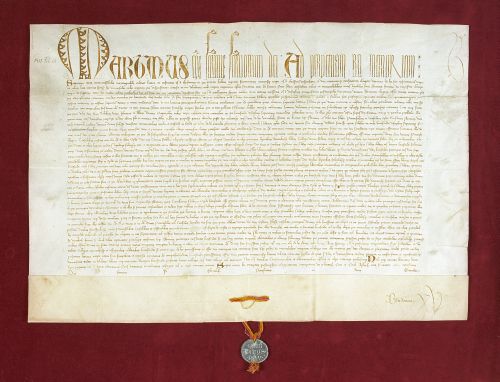
The city of Rostock was at the height of its economic power at the beginning of the 15th century, and took over the task of establishing a university for the benefit of the Hanseatic League of Cities. The intention was to ensure that the necessary academically educated leaders could now study within the Hanseatic region itself, due to the enormous extent of the Hanseatic region from Lisbon to Novgorod. However, Rostock, being a city not lacking in wealth, was forced to obtain the approval of the Mecklenburg sovereigns to found a high school. Thus, the letter of application addressed to the Pope for the foundation of a university - initiated by the council of the city of Rostock - bears the seals of the sovereigns, Dukes Albrecht V and Johann IV, and that of the city of Rostock. However, the Dukes had to admit that they did not have the necessary means to establish a university, and therefore restricted their consent to the effect that this would only take place within the scope of their powers and duties.
08.09.1418
The Bishop of Schwerin, as the representative of the Catholic Church (which had an interest in the proper training of theologians) and being responsible for spiritual life in his diocese, advocated the foundation of a university in Rostock in a letter deliberately kept secret from the Dukes.
13.02.1419
Pope Martin V approved the establishment of a Studium generale, but with just three faculties (jur, med, art.). The Faculty of Theology remained excluded because there was evidence of heretical ideas and endeavours in North Germany and the Baltic region. The Pope granted the same privileges and immunities to the future university as those granted to Vienna, Leipzig and Cologne. Deed of Foundation
29.07.1419
The citizens of Rostock agreed to the foundation of a university and instructed the city council to take the necessary steps.
29.09.1419
The City Council gave the Bishop of Schwerin - and not the Dukes - the written declaration requested by the Pope that he alone would assume responsibility for the establishment of a university. The Dukes were no longer named as participants.
12.11.1419
The ceremonial opening of the University of Rostock took place in the Marienkirche in Rostock. Master Petrus Stenbeke from Erfurt was elected Rector. The Rector, who was also Dean of the Artist Faculty, was given a pair of small sceptres for the first faculty to be established. The subsequent faculties received no sceptres. The small sceptres of the Artist Faculty also had to serve as University sceptres, because large sceptres, being a sign of the autonomy and jurisdiction granted to the University by the sovereigns, failed to materialise.
Source: 575 Jahre Universität Rostock. Mögen viele Lehrmeinungen um die eine Wahrheit ringen. Rostock 1994, S. 325-326.
Further reading:
Schmidt, Roderich: Kräfte, Personen und Motive bei der Gründung der Universitäten Rostock (1419) und Greifswald (1456). In: Schmidt, Roderich: Fundatio et confirmatio universitatis. Von den Anfängen deutscher Universitäten. Goldbach 1998, S. 215-247.
Schmidt, Tilmann: Die Gründung der Universität Rostock im Spiegel der Urkunden. In: Jakubowski, Peter; Münch, Ernst (Hg.): Universität und Stadt. Wissenschaftliche Tagung anläßlich des 575. Jubiläums der Eröffnung der Universität Rostock. Rostock 1995, S. 9-16.
Schnitzler, Elisabeth: Die Gründung der Universität Rostock 1419. Aufsätze aus den Jahren 1954-1958. Köln 1974.
Walther, Helmut G.: Die Gründung der Universität Rostock 1419-1450 im Rahmen einer spätmittelalterlichen Universitätslandschaft. In: Wieden, Helge bei der; Schmidt, Tilmann (Hg.): Mecklenburg und seine Nachbarn. Rostock 1997, S. 107-126.
1433
Pope Eugene IV, the successor to Pope Martin, approved the establishment of the missing Faculty of Theology. (Charter of Foundation for the Faculty of Theology)
1437-1443
Due to inner-city unrest, the city of Rostock was subject to outlawry (Acht) in 1431, damnation (Aberacht) in 1432, and excommunication and interdict in 1436. The University was ordered out of the city. The University, which was not primarily a church institution, decided against the city and moved its domicile to the Hanseatic city of Greifswald in 1437, where teaching continued until 1439, when it was suspended. It was unable to return until 1443.
1487-1488 (Domfehde)
The Jakobi-Kirche in Rostock (which was destroyed in the Second World War) was elevated to the status of a cathedral chapter on 12/01/1487 - against the will of the citizens and the City Council of Rostock, and against the will of the four parish churches and of the University. New unrest arose in Rostock. The city was excommunicated and the University was ordered to abandon the city. It again decided against the city and moved its domicile to the Hanseatic city of Wismar in March 1487, then, after a short stay, to Lübeck. The University continued its efforts not to overstay its absence from Rostock, and returned to Rostock in August 1488.
12.11.1519
According to the custom of the time, before the Reformation, no celebration to mark the centenary of the University was held. In addition, the plague of 1518 claimed many victims in Rostock. However, the University felt compelled to draw attention to itself. It used the anniversary as a stimulus for reorientation of the teaching. The academic reform in Leipzig in 1519 was the model for a similar reform in Rostock in 1520, and for the publication of the “Observantia lectionum in universitate Rostochiensi”. This lesson catalogue is not only a course catalogue; it also provides information on the state of affairs at the time and on the disciplines being taught.
Source: 575 Jahre Universität Rostock. Mögen viele Lehrmeinungen um die eine Wahrheit ringen. Rostock 1994, S. 326-327.
Further reading:
Franck, David: Die Rostocksche Universität geht nach Greifswald: 1. Zustand der Universität zu Rostock. 2. Deren Suspension und Emigration. 3. Zustand derselben zu Greifswald. In: Des Alt- und Neuen Mecklenburgs Achtes Buch von Mecklenburgs Vereinigung durch Zusammenfügung seiner Länder Güstrow. Leipzig 1754, S. 17-29.
Hergemöller, Bernd-Ulrich: Die Rostocker Domfehde. Vorgeschichte und parallellaufende Ereignisse. In: Hergemöller, Bernd-Ulrich: "Pfaffenkriege" im spätmittelalterlichen Hanseraum. Quellen und Studien zu Braunschweig, Osnabrück, Lüneburg und Rostock. Bd. 1., Köln 1988, S. 194-199.
Kändler, Wolfram C.; Wagner, Frank: Prosopographische Grundlagenforschung zur Universitätsgeschichte. Die Universitäten in Erfurt und Rostock im Spätmittelalter und das Repertorium Academicum Germanicum. In: Mecklenburgische Jahrbücher, Bd. 121 (2006), S. 69-92.
Krause, Ernst Hermann: Zur Geschichte der ersten Jahre der Universität Rostock. Rostock 1875.
Schnitzler, Elisabeth: Beiträge zur Geschichte der Universität Rostock im 15. Jahrhundert. Leipzig 1979.
01.04.1531
Despite the stubborn resistance of the city and the University, the Reformation gradually prevailed and was proclaimed by law on 01 April 1531. The University became Protestant, and a difficult phase of reconstruction followed.
18.08.1560
Duke Johann Albrecht applied to Emperor Ferdinand for the renewal or confirmation of the privileges of the University, which took place in a document dated 18 August 1560. All the privileges mentioned in the papal charter of 1419 remained untouched.
11.05.1563
The revival of the University after the Reformation inevitably called for clarification of its relationship with the sovereigns and the city of Rostock. The sovereigns - in line with the increasing strength of the state sovereignty - strove to exert influence on the University, which set itself in opposition to the city. However, the sovereigns and the city gave way, and a settlement called “Formula Concordiae” was reached, which fundamentally changed the conditions of the University. A peculiarity was that two colleges of professors arose - one baronial, the other advisory - which remained united by the Council, for which each patron looked after the financing. The sovereigns took over the patronage of the university, the City Council was granted the Kompatronat (joint funding).
Source: 575 Jahre Universität Rostock. Mögen viele Lehrmeinungen um die eine Wahrheit ringen. Rostock 1994, S. 327.
Further reading:
Krabbe, Otto Carsten: Die Universität Rostock im 15. und 16. Jahrhundert. Rostock 1854.
Lisch, Georg C. F.: Beiträge zur Geschichte der Reformation in Rostock und des Dom-Capitels daselbst, in: JVMGA, Bd. 16 (1851), S. 9-56.
Münch, Ernst: Bürger und Academici vor dem Hintergrund der Formula concordiae. Die Universität Rostock in den Augen der Stadt. In: Jakubowski, Peter; Münch, Ernst (Hg.): Universität und Stadt. Wissenschaftliche Tagung anläßlich des 575. Jubiläums der Eröffnung der Universität Rostock. Rostock 1995, S. 69-82.
Pluns, Marko A.: Die Universität Rostock 1418-1563. Eine Hochschule im Spannungsfeld zwischen Stadt, Landesherren und wendischen Hansestädten. Köln u.a. 2007.

